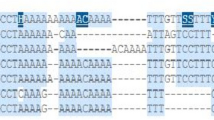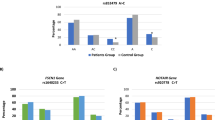Abstract
BRCA1 is a crucial tumor suppressor which plays an essential role in maintaining genomic stability and integrity. Accumulated evidences demonstrated that there is frequent chromosome loss of BRCA1 or significant BRCA1 down-regulation via hypermethylation of its promoter in human gastric cancer specimens, highlighting the tumor-suppressing function of BRCA1 in gastric carcinogenesis. There is an rs799917 T>C single nucleotide polymorphism (SNP) located in the BRCA1 coding sequence (CDS). This SNP can disturb the interaction between BRCA1 mRNA and miR-638 and result in significantly decreased BRCA1 expression among carriers of rs799917C allele. In this study, we investigated the association between rs799917 and gastric cancer risk in a Chinese Han population using a case–control design. A total of 660 gastric cancer patients and 800 controls were enrolled and genotyped. Odds ratios (ORs) and 95 % confidence intervals (CIs) were calculated by logistic regression. We found that individuals with the rs799917 CT genotype was significantly associated with gastric cancer risk (OR = 1.81, 95 % CI = 1.28–2.56; P = 0.001). Individuals having the rs799917 CC genotype had an OR of 1.40 (95 % CI = 1.17–1.68; P = 2.2 × 10−4) for developing gastric cancer, compared with individual having the rs799917 TT genotype. However, stratified analyses did not find any evident gene–covariates interaction. Our results for the first time indicate that the functional BRCA1 rs799917 polymorphism contributes to gastric cancer susceptibility.

Similar content being viewed by others
References
Hohenberger P, Gretschel S. Gastric cancer. Lancet. 2003;362(9380):305–15.
Jemal A, Siegel R, Xu J, Ward E. Cancer statistics, 2010. CA Cancer J Clin. 2010;60(5):277–300.
Lichtenstein P, Holm NV, Verkasalo PK, Iliadou A, Kaprio J, Koskenvuo M, et al. Environmental and heritable factors in the causation of cancer—analyses of cohorts of twins from Sweden, Denmark, and Finland. N Engl J Med. 2000;343(2):78–85.
Krejs GJ. Gastric cancer: epidemiology and risk factors. Dig Dis. 2010;28(4–5):600–3.
Muñoz N, Franceschi S. Epidemiology of gastric cancer and perspectives for prevention. Salud Publica Mex. 1997;39(4):318–30.
Lin SH, Li YH, Leung K, Huang CY, Wang XR. Salt processed food and gastric cancer in a Chinese population. Asian Pac J Cancer Prev. 2014;15(13):5293–8.
Strumylaite L, Zickute J, Dudzevicius J, Dregval L. Salt-preserved foods and risk of gastric cancer. Med (Kaunas). 2006;42(2):164–70.
Nouraie M, Pietinen P, Kamangar F, Dawsey SM, Abnet CC, Albanes D, et al. Fruits, vegetables, and antioxidants and risk of gastric cancer among male smokers. Cancer Epidemiol Biomarkers Prev. 2005;14(9):2087–92.
Steevens J, Schouten LJ, Goldbohm RA, van den Brandt PA. Alcohol consumption, cigarette smoking and risk of subtypes of oesophageal and gastric cancer: a prospective cohort study. Gut. 2010;59(1):39–48.
Lindblad M, Rodríguez LA, Lagergren J. Body mass, tobacco and alcohol and risk of esophageal, gastric cardia, and gastric non-cardia adenocarcinoma among men and women in a nested case–control study. Cancer Causes Control. 2005;16(3):285–94.
Jin G, Ma H, Wu C, Dai J, Zhang R, Shi Y, et al. Genetic variants at 6p21.1 and 7p15.3 are associated with risk of multiple cancers in Han Chinese. Am J Hum Genet. 2012;91(5):928–34.
Shi Y, Hu Z, Wu C, Dai J, Li H, Dong J, et al. A genome-wide association study identifies new susceptibility loci for non-cardia gastric cancer at 3q13.31 and 5p13.1. Nat Genet. 2011;43(12):1215–8.
Abnet CC, Freedman ND, Hu N, Wang Z, Yu K, Shu XO, et al. A shared susceptibility locus in PLCE1 at 10q23 for gastric adenocarcinoma and esophageal squamous cell carcinoma. Nat Genet. 2010;42(9):764–7.
Study Group of Millennium Genome Project for Cancer, Sakamoto H, Yoshimura K, Saeki N, Katai H, Shimoda T, et al. Genetic variation in PSCA is associated with susceptibility to diffuse-type gastric cancer. Nat Genet. 2008;40(6):730–40.
Miki Y, Swensen J, Shattuck-Eidens D, Futreal PA, Harshman K, Tavtigian S, et al. A strong candidate for the breast and ovarian cancer susceptibility gene BRCA1. Science. 1994;266(5182):66–71.
Roy R, Chun J, Powell SN. BRCA1 and BRCA2: different roles in a common pathway of genome protection. Nat Rev Cancer. 2011;12(1):68–78.
Huen MS, Sy SM, Chen J. BRCA1 and its toolbox for the maintenance of genome integrity. Nat Rev Mol Cell Biol. 2010;11(2):138–48.
Petty EM, Kalikin LM, Orringer MB, Beer DG. Distal chromosome 17q loss in Barrett’s esophageal and gastric cardia adenocarcinomas: implications for tumorigenesis. Mol Carcinog. 1998;22(4):222–8.
Semba S, Yokozaki H, Yasui W, Tahara E. Frequent microsatellite instability and loss of heterozygosity in the region including BRCA1 (17q21) in young patients with gastric cancer. Int J Oncol. 1998;12(6):1245–51.
Bernal C, Vargas M, Ossandón F, Santibáñez E, Urrutia J, Luengo V, et al. DNA methylation profile in diffuse type gastric cancer: evidence for hypermethylation of the BRCA1 promoter region in early-onset gastric carcinogenesis. Biol Res. 2008;41(3):303–15.
Cao L, Xu X, Cao LL, Wang RH, Coumoul X, Kim SS, et al. Absence of full-length Brca1 sensitizes mice to oxidative stress and carcinogen-induced tumorigenesis in the esophagus and forestomach. Carcinogenesis. 2007;28(7):1401–7.
Nicoloso MS, Sun H, Spizzo R, Kim H, Wickramasinghe P, Shimizu M, et al. Single-nucleotide polymorphisms inside microRNA target sites influence tumor susceptibility. Cancer Res. 2010;70(7):2789–98.
Li D, Wang Q, Liu C, Duan H, Zeng X, Zhang B, et al. Aberrant expression of miR-638 contributes to benzo(a)pyrene-induced human cell transformation. Toxicol Sci. 2012;125(2):382–91.
Zhang X, Wei J, Zhou L, Zhou C, Shi J, Yuan Q, et al. A functional BRCA1 coding sequence genetic variant contributes to risk of esophageal squamous cell carcinoma. Carcinogenesis. 2013;34(10):2309–13.
Wu C, Kraft P, Zhai K, Chang J, Wang Z, Li Y, et al. Genome-wide association analyses of esophageal squamous cell carcinoma in Chinese identify multiple susceptibility loci and gene–environment interactions. Nat Genet. 2012;44(10):1090–7.
Liu J, Tang X, Li M, Lu C, Shi J, Zhou L, et al. Functional MDM4 rs4245739 genetic variant, alone and in combination with P53 Arg72Pro polymorphism, contributes to breast cancer susceptibility. Breast Cancer Res Treat. 2013;140(1):151–7.
Yang M, Zhang L, Bi N, Ji W, Tan W, Zhao L, et al. Association of P53 and ATM polymorphisms with risk of radiation-induced pneumonitis in lung cancer patients treated with radiotherapy. Int J Radiat Oncol Biol Phys. 2011;79(5):1402–7.
Li Z, Guo Y, Zhou L, Ge Y, Wei L, Li L, et al. Association of a functional RAD52 genetic variant locating in a miRNA binding site with risk of HBV-related hepatocellular carcinoma. Mol Carcinog. 2014. doi:10.1002/mc.22156.
Fan C, Wei J, Yuan C, Wang X, Jiang C, Zhou C, et al. The functional TP53 rs1042522 and MDM4 rs4245739 genetic variants contribute to non-Hodgkin lymphoma risk. PLoS One. 2014;9(9):e107047.
Lu C, Chen YD, Han S, Wei J, Ge Y, Pan W, et al. A RAD52 genetic variant located in a miRNA binding site is associated with glioma risk in Han Chinese. J Neurooncol. 2014
Zhou L, Zhang X, Li Z, Zhou C, Li M, Tang X, et al. Association of a genetic variation in a miR-191 binding site in MDM4 with risk of esophageal squamous cell carcinoma. PLoS One. 2013;8(5):e64331.
Yao J, Liu L, Yang M. Interleukin-23 receptor genetic variants contribute to susceptibility of multiple cancers. Gene. 2014;533(1):21–5.
Conflicts of interest
None
Author information
Authors and Affiliations
Corresponding authors
Additional information
Kun Wang and Longfang Xu contributed equally to this work.
Rights and permissions
About this article
Cite this article
Wang, K., Xu, L., Pan, L. et al. The functional BRCA1 rs799917 genetic polymorphism is associated with gastric cancer risk in a Chinese Han population. Tumor Biol. 36, 393–397 (2015). https://doi.org/10.1007/s13277-014-2655-9
Received:
Accepted:
Published:
Issue Date:
DOI: https://doi.org/10.1007/s13277-014-2655-9




